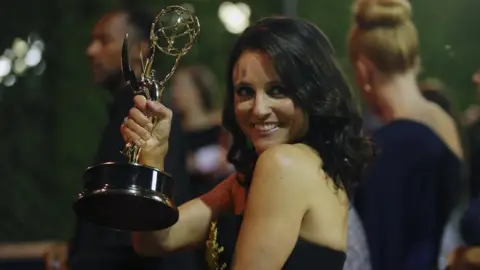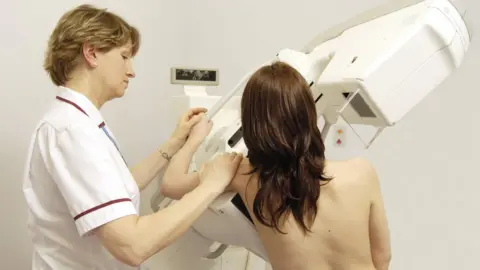Veep star Julia Louis-Dreyfus reveals breast cancer diagnosis
 Reuters
ReutersJulia Louis-Dreyfus, the award-winning star of US TV comedy series Veep, has announced she has breast cancer, in a message posted on social media.
"1 in 8 women get breast cancer," she wrote. "Today I'm the one."
"The good news", she said, was that she had a "glorious group" of family and friends supporting her and "fantastic" insurance through her union.
The actress, 56, has also featured in Saturday Night Live, The New Adventures of Old Christine and Seinfeld.
Allow X content?
Earlier this month, Louis-Dreyfus picked up a record-breaking sixth Emmy Award for Outstanding Lead Actress in a row for her role in HBO series Veep.
In Veep, her character begins as an ineffectual US vice-president whose attempts to expand her role are continually thwarted.
Louis-Dreyfus' announcement was met with an outpouring of support from other actors and celebrities.
Her Veep co-star Tony Hale retweeted the announcement, appending the message: "We love this woman."
Christina Applegate, who had a double mastectomy in 2008 following her own breast cancer diagnosis, told Louis-Dreyfus to contact her if she wanted to talk.
Former Vice President Joe Biden, who lost his son Beau to cancer in 2015, sent his family's best wishes.
Allow X content?
HBO, the network behind Veep, also issued a statement, saying: "We have every confidence she will get through this with her usual tenacity and undaunted spirit, and look forward to her return to health and to HBO for the final season of Veep."
'Universal healthcare'
The US actors' union SAG-AFTRA provides health insurance as a membership benefit, which union members earn credits toward as they work on accredited productions.
"The bad news is that not all women are so lucky," Louis-Dreyfus said in her statement, "so let's fight all cancers and make universal health care a reality".
Her call for universal health care - at a time when US President Donald Trump is pushing through healthcare reforms - is not the first time she has made targeted political comments.
Accepting the award for outstanding performance for a female actor in a comedy series at the SAG Awards earlier this year, she referenced Mr Trump's controversial travel ban, saying: "I am the daughter of an immigrant. My father fled religious persecution in Nazi-occupied France."
"I'm an American patriot, and I love this country... this immigrant ban is a blemish and it's un-American."

Breast cancer: The facts
Breast cancer is the most common cancer in women in the world.
The rates of breast cancer vary from country to country - about one in eight women will get breast cancer during their lifetime in the US and the UK.
About 55,000 people are diagnosed with the condition in the UK every year - about 150 people a day. It is far more common among women, affecting just one in every 870 men.
 Science Photo Library
Science Photo LibraryMedical experts recommend women be aware of what their breasts normally look and feel like, so they can be aware of any abnormal changes.
Possible signs of breast cancer include:
- Changes in the outline or shape of the breast, especially those caused by arm movements or by lifting the breast
- Changes in the look or feel of the skin, such as puckering or dimpling
- Any new lumps, thickening or bumpy areas in one breast or armpit, with or without pain, that differs from the same part of the other breast and armpit
- Discharge from the nipple (may be bloodstained)
- Moist, red areas on the nipple that don't heal easily
- Any change in nipple position, such as being pulled in or pointing differently
- A rash on or around the nipple
Recovery chances are good if the cancer is discovered in its early stages. Breast screening programmes use a mammogram - a type of X-ray - to sweep for small cancers in their infancy.
Sources: World Health Organization, NHS, Cancer Research UK

